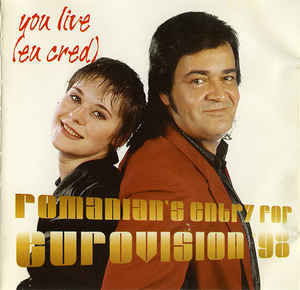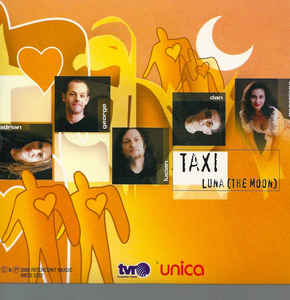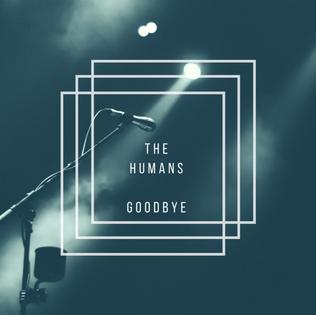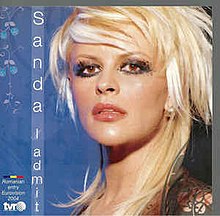
Romania has participated in the Eurovision Song Contest 21 times since its debut in 1994, and has placed in the top ten six times. Its best results were achieved by Luminița Anghel and Sistem in 2005, and by Paula Seling and Ovi in 2010, who both finished in third place. Selecția Națională, a song contest that has been taking place every year in Romania except for 2021, has been used to select the country's entry for the Eurovision Song Contest. The later year saw Romania conducting an internal selection.
Romania participated in the Eurovision Song Contest 2006 in Athens, Greece. They selected their entry, "Tornerò", by Romanian singer Mihai Trăistariu through the national selection competition Selecția Națională 2006 in February 2006. Controversy surrounded the event, as seventh-placed duo Indiggo accused the organising broadcaster, Romanian Television (TVR), of vote rigging. Prior to the 2006 contest, Romania had participated in the Eurovision Song Contest eight times since its first entry in 1994. Its highest placing in the contest had been third place, which the nation achieved in 2005.
Romania participated in the Eurovision Song Contest 2005 in Kyiv, Ukraine. They selected their entry, "Let Me Try" by Romanian singer Luminița Anghel and group Sistem, through the national selection Selecția Națională 2005 in March 2005. Controversy surrounded the event, as second-placed singer Loredana accused the organising broadcaster, Romanian Television (TVR), of vote rigging. Prior to the 2005 contest, Romania had participated in the Eurovision Song Contest seven times since its first entry in 1994. Its highest placing in the contest, to this point, had been ninth place, which the nation achieved in 2002. In 2004, they placed 18th in the final.
Romania participated in the Eurovision Song Contest 2007 in Helsinki, Finland. They selected their entry, "Liubi, Liubi, I Love You" by Romanian group Todomondo through the national selection competition Selecția Națională 2007 in February 2007. Controversy surrounded the event, as Romanian Television (TVR) disqualified several entries over the course of the competition. Prior to the 2007 contest, Romania had participated in the Eurovision Song Contest nine times since its first entry in 1994. Its highest placing in the contest had been third place, which the nation achieved in 2005. In 2006, Romania finished in fourth place. Prior to Eurovision, "Liubi, Liubi, I Love You" was promoted by a music video and a promotional tour in Belarus. Todomondo ultimately achieved 13th place in the contest's Grand Final on 12 May 2007, scoring 84 points. Their performance saw the use of pyrotechnics.

"Eu cred" is a song recorded by Romanian singer Mălina Olinescu. It was recorded at the TVR Music Studio in Bucharest, and was released as a CD single in 1998 by Mega Music in Romania. The release also contained "You Live", the English-language version of the song. "Eu cred" was written by Liliana Ștefan, while production was handled by Adrian Romcescu.

"Liubi, Liubi, I Love You" is a song recorded by Romanian group Todomondo, consisting of Andrei Ștefănescu, Ciro de Luca, Kamara Ghedi, Bogdan Tașcău, Valeriu Răileanu and Vlad Crețu. It was released as a CD single in 2007 by the Romanian Television (TVR) in Romania. The track is multilingual and is performed in six languages: English, Romanian, Spanish, Italian, French and Russian. Tașcău produced the song and co-wrote it with Crețu and Ghedi. Its lyrics deal with the theme of love and European clichés.

"The Moon" is a song recorded by Romanian group Taxi. It was released as a CD single in 2000 by Intercont Music in Romania, containing its Romanian-language version "Luna" as a B-side. "The Moon" was written and produced solely by Teodorescu. It represented Romania in the Eurovision Song Contest 2000 in Stockholm, Sweden, after "Luna" won the pre-selection show Selecția Națională. In Stockholm, Romania automatically qualified to the final due to their relegation in the previous year and finished in 17th place with 25 points.

"Don't Break My Heart" is a song recorded by Romanian singer Nicola for her greatest hits album Best of Nicola (2003) and fourth studio album De mă vei chema (2004). Written by Nicola and produced by her then-husband Mihai Alexandru, it was released as a CD single in 2003 by Cat Music. Musically, "Don't Break My Heart" is an uptempo dance recording.
Romania participated in the Eurovision Song Contest 2008 in Belgrade, Serbia. They selected their entry, "Pe-o margine de lume", by Romanian singers Nico and Vlad through the national selection competition Selecția Națională 2008 in February 2008. Controversy surrounded the event, as the organising broadcaster, Romanian Television (TVR), was accused of conspiracy, and the song reviewed for plagiarism. Prior to the 2008 contest, Romania had participated in the Eurovision Song Contest ten times since its first entry in 1994. Its highest placing in the contest had been third place, which the nation achieved in 2005. In 2007, Romania finished in 13th place.

"Pe-o margine de lume" is a song by Romanian singers Nico and Vlad Miriță, released on an enhanced CD in 2008 by Cat Music in Romania. It was written by Andreea Andrei and Adina Șuteu, while production was solely handled by Andrei Tudor. An operatic ballad performed in Romanian and Italian, it was likened to the works of Italian singer Andrea Bocelli by music critics. "Pe-o margine de lume" was originally recorded as a solo by Miriță.
Romania participated in the Eurovision Song Contest 2009 in Moscow, Russia. They selected their entry, "The Balkan Girls", by Romanian singer Elena through the national selection competition Selecția Națională 2009 organised by Romanian Television (TVR) in January 2009. Prior to the 2009 Eurovision Song Contest, Romania competed eleven times since its first entry in 1994. Its highest placing in the contest had been third place, which the nation achieved in 2005. In 2008, Romania finished in 20th place. "The Balkan Girls" attained local commercial success, topping the Romanian Top 100 in April.

"The Balkan Girls" is a song by Romanian singer Elena Gheorghe for a special 2009 edition of her second studio album, Te Ador (2008), and third record, Disco Romancing (2012). It was written by Laurențiu Duță and Alexandru Pelin, while production was handled by Duță, Ovidiu Bistriceanu and Daris Mangal. The song was released on an enhanced CD on 6 January 2009 by Cat Music. "The Balkan Girls" is a folk-influenced dance-pop song whose refrain celebrates the party life of Balkan girls.
Romania attempted to debut in the Eurovision Song Contest 1993, held that year in Millstreet, Ireland, being one of seven countries interested in taking part in the contest for the first time. A national final, Selecția Națională 1993 organized by Romanian Television (TVR), was held in January 1993, and "Nu pleca", written and performed by the Romanian singer Dida Drăgan and composed by Adrian Ordean, was selected to be the Romanian entry. For a place in the finals of the contest, Romania had to compete in a pre-qualifying round, Kvalifikacija za Millstreet, that took place in Ljubljana, Slovenia. The song ranked last, and so failed to qualify for the finals in Ireland. Predominantly negative reactions from Romanian media followed as a result of Drăgan's poor performance.
Romania participated in the Eurovision Song Contest 2011 with the song "Change" written by Gabriel Băruță and Alexandra Ivan. The song was performed by the band Hotel FM. The Romanian broadcaster Televiziunea Română (TVR) organised the national final Selecția Națională 2011 in order to select the Romanian entry for the 2011 contest in Düsseldorf, Germany. Thirteen entries were selected to compete in the national final on 31 December 2010 where "Change" performed by Hotel FM was selected as the winner after scoring top marks from an eleven-member jury panel and a public televote.

"Moment of Silence" is a song recorded by Romanian singer Ovidiu Anton. It was written and composed by himself, while production was handled by Liviu Sorescu. A gothic-inspired pop rock track featuring an electric guitar solo throughout, "Moment of Silence" acts as a homage to the victims of the 2015 Colectiv nightclub fire. It received mixed reviews from music critics, with one likening it to the works of Swedish band Europe. At the 2017 Radio România Actualități Awards, the track won in the Best Pop Rock Song category.
Romania participated in the Eurovision Song Contest 2017 with the song "Yodel It!" written by Mihai Alexandru and Alexandra Niculae. The song was performed by Ilinca and Alex Florea. In October 2016, the Romanian broadcaster Televiziunea Română (TVR) announced that they would be returning to the Eurovision Song Contest after a one-year absence following their forced withdrawal in 2016 due to repeated non-payment of debts to the European Broadcasting Union (EBU). TVR organised the national final Selecția Națională 2017 in order to select the Romanian entry for the 2017 contest in Kyiv, Ukraine. The national final consisted of two shows: a semi-final and a final. Fifteen entries were selected to compete in the semi-final on 26 February 2017 where a five-member jury panel selected ten entries to advance to the final. The ten qualifiers competed in the final on 5 March 2017 where "Yodel It!" performed by Ilinca and Alex Florea was selected as the winner entirely by a public vote.
Romania participated in the Eurovision Song Contest 2018 with the song "Goodbye" written by Alexandru Matei, Alin Neagoe and Cristina Caramarcu. The song was performed by the Humans. The Romanian broadcaster Televiziunea Română (TVR) organised the national final Selecția Națională 2018 in order to select the Romanian entry for the 2018 contest in Lisbon, Portugal. The national final consisted of six shows: five semi-finals and a final. A total of sixty entries were selected and twelve competed in each semi-final where a five-member jury panel selected three entries to advance to the final. The fifteen qualifiers competed in the final on 25 February 2018 where "Goodbye" performed by The Humans was selected as the winner entirely by a public vote.

"Goodbye" is a song recorded by Romanian group The Humans, released on 12 January 2018 by Roton. The track was written by vocalist Cristina Caramarcu, while production and composition were handled by fellow members Alexandru Matei and Alin Neagoe. "Goodbye" is a 1980s-inspired soft rock and pop rock ballad whose instrumentation includes a cello; lyrically, it is a manifesto that discourages the abandonment of one's dreams. It also discusses the overcoming of suicidal ideation, depression and internal battles. Reviewers likened the track to the music of Bonnie Tyler, Celine Dion and Heart.
Romania was scheduled to participate in the Eurovision Song Contest 2020 in Rotterdam, Netherlands before its cancellation due to the pandemic of the coronavirus disease 2019 (COVID-19) in China and its spread to other countries. Romania's artist, Roxen, was internally selected and announced on 11 February 2020. Their competing entry, "Alcohol You", was chosen during the national selection competition Selecția Națională 2020 on 1 March. Prior to the 2020 contest, Romania had participated in the Eurovision Song Contest 20 times since its first entry in 1994. Its highest placing had been third place, which the nation achieved in 2005 and 2010. In 2019, they failed to qualify for the contest's final for the second consecutive year. Prior to the scheduled Eurovision Song Contest 2020, "Alcohol You" was promoted by a lyric video, while Roxen appeared on several native talk shows and radio stations.
Romania is scheduled to participate in the Eurovision Song Contest 2022 in Turin, Italy, with "Llámame" performed by WRS. The Romanian broadcaster, Televiziunea Română (TVR), organised the national final Selecția Națională 2022 in order to select the Romanian entry for the 2022 contest. The national final consisted of three shows, including two semi-finals and a final. A total of 46 entries were selected and 10 qualifiers ultimately competed in the final on 5 March 2022, where the winner scoring top marks from both a jury panel and a public televote was selected.








